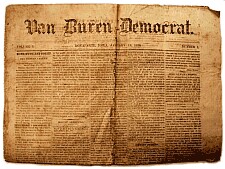Van Buren Democrat
Bonaparte, Iowa
more info
January 19, 1870
Volume 1; Number 1 [first issue]
8 Pages
Pages 1 & 2 Pages 3 & 4 Pages 5 & 6 Pages 7 & 8 Transcribed by Rich Lowe for the Van Buren County IAGenWeb Project - copyright 2007
